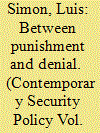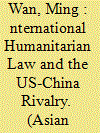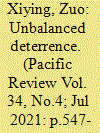|
|
|
Sort Order |
|
|
|
Items / Page
|
|
|
|
|
|
|
| Srl | Item |
| 1 |
ID:
172104


|
|
|
|
|
| Summary/Abstract |
Most debates on U.S. military strategy in the Western Pacific revolve around the question of how to deter China. Advocates of deterrence by punishment believe that the Chinese threat is serious but not critical, because the United States can leverage its global military-technological advantages to preserve a position of regional military primacy. Those in favor of deterrence by denial point to China’s potential and “home advantages,” and argue that the United States should settle for more modest objectives such as preventing Chinese regional military dominance. I argue that the high level of uncertainty around Chinese capabilities and the evolving Sino-American regional military balance have led the United States to adopt a flexible strategy, and embrace distinct–even contradictory–operational concepts to deter Beijing: The United States itself mostly focuses primarily on deterrence by punishment, while actively encouraging and enabling its regional allies to develop deterrence by denial.
|
|
|
|
|
|
|
|
|
|
|
|
|
|
|
|
| 2 |
ID:
177878


|
|
|
|
|
| Summary/Abstract |
The return of great power rivalry has been the defining feature of the 21st century. Since the beginning of the new millennium, China and Russia have openly defied the United States and upset the stability of the liberal international order. Both China and Russia share physical and material attributes possessed by the United States that are traditionally required for great power status: land mass, a sea portal, a large population, and technology to field and develop a competitive military capability. Most scholars and policymakers agree that China presents the largest challenge to US interests and the US-led liberal international order. Economic and military growth in China has been astounding, surpassing Russian expansion. China’s outward extension is not primarily resource-based as is Russia’s but multidimensional, posing a structural challenge to US military and economic dominance.
|
|
|
|
|
|
|
|
|
|
|
|
|
|
|
|
| 3 |
ID:
187971


|
|
|
|
|
| Summary/Abstract |
The US government has shifted strategic focus from war on terror to great power contest with China and Russia. But there has not been corresponding thinking about the role of international humanitarian law (IHL) and the law of war (LOW) in the United States or China. Both IHL and human rights law (HRL) originated from Western legal traditions and advantage the United States and the West. China had to adapt and is now challenging the West-dominated international order, a major source of its tension with the United States. Both China and the United States invoked the Geneva Conventions against each other during the Korean War. The war took place seven decades ago, and much has changed since then. But it is the only precedent between the two great powers. LOW provides a structure for managing conflict between the great powers. In turn, a rivalry between the two greatest powers would make IHL narrowly based on national interests and weaken its linkage to human rights.
|
|
|
|
|
|
|
|
|
|
|
|
|
|
|
|
| 4 |
ID:
179538


|
|
|
|
|
| Summary/Abstract |
After Tsai Ing-wen was elected, both Mainland China and the United States realized that the situation in the Taiwan Strait has undergone fundamental changes. In order to curb Taiwan’s independence policy, the Mainland China has strengthened its coercive threats against Taiwan while the US chose to increase its strategic commitment to Taiwan and revisit the One-China policy. This article argues the current framework between China and US on Taiwan issue is collapsing. The rising of Mainland China is the root cause for this round tension, however, Tsai Ing-wen refused to accept the 92 consensus which was the trigger. This article elaborates the argument that the delicate balance in the Taiwan Strait is declining, which both China and the United Stated have increased their deterrent threats to each other while decreased their reassurances, and regional crisis is emerging. For the leaders of China and the United States, it is urgent to manage the emerging Taiwan Strait crisis and prevent the situation from going out of control.
|
|
|
|
|
|
|
|
|
|
|
|
|
|
|
|
| 5 |
ID:
179177


|
|
|
|
|
| Summary/Abstract |
Former President Donald Trump was the first US president to bring the US-China conflict into the open. His successor, President Joe Biden, has consistently indicated that the rift between the two countries can no longer be closed. The tone of the Biden administration’s Interim National Security Strategic Guidance, released on March 3, 2021, suggests that, differences in rhetoric aside, little distinguishes the new administration’s position on China from that of the Trump administration.1 Meanwhile, there has been no change in behavior on the part of China since the Biden administration took office. As the US-China rift is essentially the result of a “Thucydides trap,” the lack of dramatic change in US-China relations with the incoming administration comes as no surprise. However, even if the conflict between the United States and China is inevitable, we cannot sit back and watch as tensions escalate, for there is no doubt that any zero-sum competition between the two global powers would undermine peace and prosperity in East Asia and throughout the world.
|
|
|
|
|
|
|
|
|
|
|
|
|
|
|
|
| 6 |
ID:
189653


|
|
|
|
|
| Summary/Abstract |
The Middle East holds immense importance due to its natural resources and strategic location, making it a significant source of energy for both the United States and China. As such, the US-China rivalry in this region has major implications for regional stability, security, and global politics. The two countries have economic, strategic, and geopolitical interests in the region, including access to oil and gas resources, trade, and alliances with key actors.
|
|
|
|
|
|
|
|
|
|
|
|
|
|
|
|
|
|
|
|
|